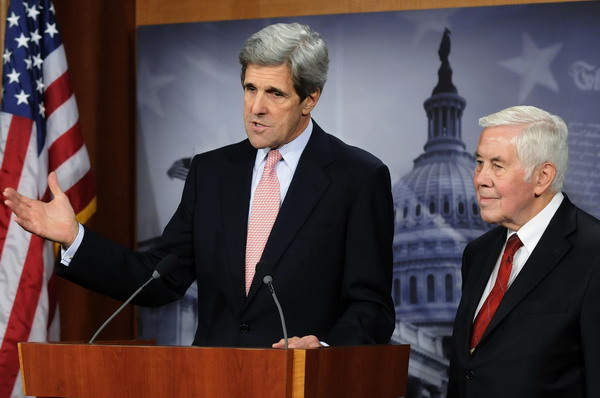America
US-Russia arms pact 'set to pass'
Updated: 2010-12-22 10:01
(Agencies)
|
 US Senator John Kerry (D-MA) (L) and Senator Richard Lugar (R-IN) (R) address a news conference to discuss their support of ratifying the new START treaty, at the US Capitol in Washington, Dec 21, 2010. [Photo/Agencies]
|
| ||||
"This treaty will make America safer and restore our leadership in global efforts to stop nuclear proliferation," Senate Democratic Leader Harry Reid said.
But Senator John Kerry, who led the floor debate as chairman of the Foreign Relations Committee, cautioned: "This is not over. We have to count every vote."
At least 12 Republicans have said that they will vote with Democrats to approve the pact, which would give Obama his third major victory on Capitol Hill in less than a week.
He earlier won repeal of the US ban on gays serving openly in the military and passage of an $858 billion deal with Republicans to extend expiring tax cuts and spur economic growth.
The treaty, which would cut strategic atomic weapons deployed by each country to no more than 1,550 within seven years, was signed by Obama and Russian President Dmitry Medvedev in April.
It is a centerpiece of Obama's bid to "re-set" relations with Russia, which has been increasingly cooperative on issues related to US national security, from curbing Iran's nuclear program to the war in Afghanistan.
Russian "veto" Power
Republican opponents of the accord, angered by the their inability to stop the march toward passage, charged the Obama administration had negotiated a bad treaty that let Russia limit US missile defense options when the real strategic threat was not Moscow but states like North Korea and Iran.
"Nothing that he has done has convinced me that he is committed to missile defense," Senator Lindsey Graham told a news conference, saying Obama was effectively "giving the Russians a veto" over its missile defense plans.
The Senate's top two Republicans- Minority Leader Mitch McConnell and Minority Whip Jon Kyl- have announced they will vote against START, saying lawmakers haven't had enough time to fully consider the treaty.
But the chamber's third-ranking Republican, Lamar Alexander, joined Democrats on Tuesday in agreeing to end debate and move to approval of the pact.
"I will vote to ratify the New Start Treaty ... because it leaves our country with enough nuclear warheads to blow any attacker to kingdom come, and because the president has committed to an $85 billion, 10-year plan to make sure that those weapons work," Alexander declared in a Senate speech.
Alexander's state of Tennessee is home to one of the nuclear facilities that will receive billions of dollars in modernization funding under an agreement worked out between lawmakers and the White House.
Political analysts say Senate rejection of the treaty would be a major setback to warming ties between the Russia and the United States, giving ammunition to Russian hawks who oppose the thaw in relations with Washington.
Collapse of the pact would also inflict political damage on Medvedev, who has embraced Obama's efforts to improve relations and stepped up Russian support for US efforts to rein in Iran's nuclear program.
There has been far less public or political debate over the treaty in Russia. The Russian State Duma has yet to approve the accord and Medvedev has made clear that parliament should not ratify the treaty until US Senate approval is certain.
Konstantin Kosachyov, the pro-Kremlin chairman of the international affairs committee, said Russian lawmakers would carefully examine the US Senate's resolution of ratification and other declarations before proceeding with their own vote, which could conceivably be held this year.
E-paper

Ear We Go
China and the world set to embrace the merciful, peaceful year of rabbit
Preview of the coming issue
Carrefour finds the going tough in China
Maid to Order
Specials

Mysteries written in blood
Historical records and Caucasian features of locals suggest link with Roman Empire.

Winning Charm
Coastal Yantai banks on little things that matter to grow

New rules to hit property market
The State Council launched a new round of measures to rein in property prices.



